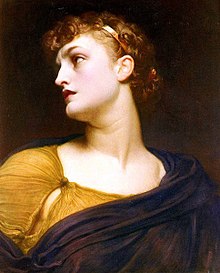
Antigone Page 4
We found 37 free papers on Antigone
Essay Examples
Overview
Antigone Reaction Assignment
Antigone
Screen’s belief than an individual’s true nature can only truly be assessed when that individual is placed in a position of leadership. When someone is put into an important role like that in any society, he either fails or succeeds while doing the job. When one does not meet the expectations of his citizens, he…
Antigone & Fate Story
Antigone
The story of Antigone explores the Greek belief in fate and the power of the gods, as well as the existence of human free will. Within this narrative, Creon faces a crucial decision regarding his own destiny. While he possesses the ability to choose his actions based on his free will, he also recognizes that…
Compare the portrayal of Creon in Oedipus the King and Antigone Sample
Antigone
Oedipus
In both dramas Creon is of high societal position. In Antigone he is the male monarch of Thebes. In Oedipus the King he is the brother in jurisprudence to Oedipus and becomes king at the terminal of the drama. In Antigone. Creon is portrayed as a chief character as the secret plan revolves around him…
Main Character Problems in the Play Antigone Research Paper
Antigone
Antigone in the play faces issues with two other characters: Ismene, her sister, and Creon, the ruler of Thebes. Apart from this, there exist other conflicts as well, like the one between Creon and his son, Haemon, who eventually takes his own life. Hegel asserts that Antigone represents a “tragic collision of right against right,…
Character Analysis of Antigone
Antigone
Character Analysis
Greek drama was written in such a way that the characters are the pivotal aspect of the play. The main characters in Sophocles’ epic play, Antigone, are both very strong personalities, which naturally leads to conflict. Antigone and King Creon both have very intense beliefs and roles in this play that oppose each other, and…
Antigone Sophocles Analysis
Antigone
Sophocles
In analyzing the masterpiece that is “Antigone” by Sophocles, one cannot discredit the era when it was conceived. The culture of the Greeks is strongly discussed in the play. Ancient Greece during that time held ideals that tried to pose solutions to their lives’ very complicated queries. From spending a lot of energy on the…
Antigone Analysis – literary techniques
Antigone
Techniques
After hearing the final verdict of Antigone’s grim fate, Haemon calmly confronts his father Creon – giving the impression of being fully devoted and supportive of his father’s will and wisdom. A somewhat astonished Creon, praises Haemon’s reverence and acceptance for what seems like compliance to Antigone’s death. He then launches into a brief speech…
| genre | Tragedy |
|---|---|
| description | Antigone is a tragedy by Sophocles written in or before 441 BC. Of the three Theban plays Antigone is the third in order of the events depicted in the plays, but it is the first that was written. The play expands on the Theban legend that predates it, and it picks up where Aeschylus' Seven Against Thebes ends. |
| characters | Creon, Antigone, Ismene, Haemon, Eurydice of Thebes, Tiresias, Sentry, Polynices |
| information | Playwright: Sophocles Brother: Eteocles Chorus: Theban Elders Date premiered: c. 441 BCE Tragic flaws: Her tragic flaw is that she has hubris, which is excessive pride, and that leads her to be unbending. Ironically, Antigone means unbending in Greek. Because she is unbending, she will not denounce her decision to bury Polynices. This angers CreonCreonIn Oedipus Rex, Creon is a brother of queen Jocasta, the wife of King Laius as well as Oedipus. Laius, a previous king of Thebes, had given the rule to Creon while he went to consult the oracle at Delphi. Location: setting (place) Antigone and Oedipus the King are set in Thebes, Oedipus at Colonus in Colonus (near Athens)., Age: Thus Antigone should be thought of as a 15 year old at most, and possibly as much younger ( 12 or 13). Her behaviour – wild and defiant is not unheard of in girls of that age. In fact it was recognised as a problem in Athenian culture, to be managed by a strange custom., |

